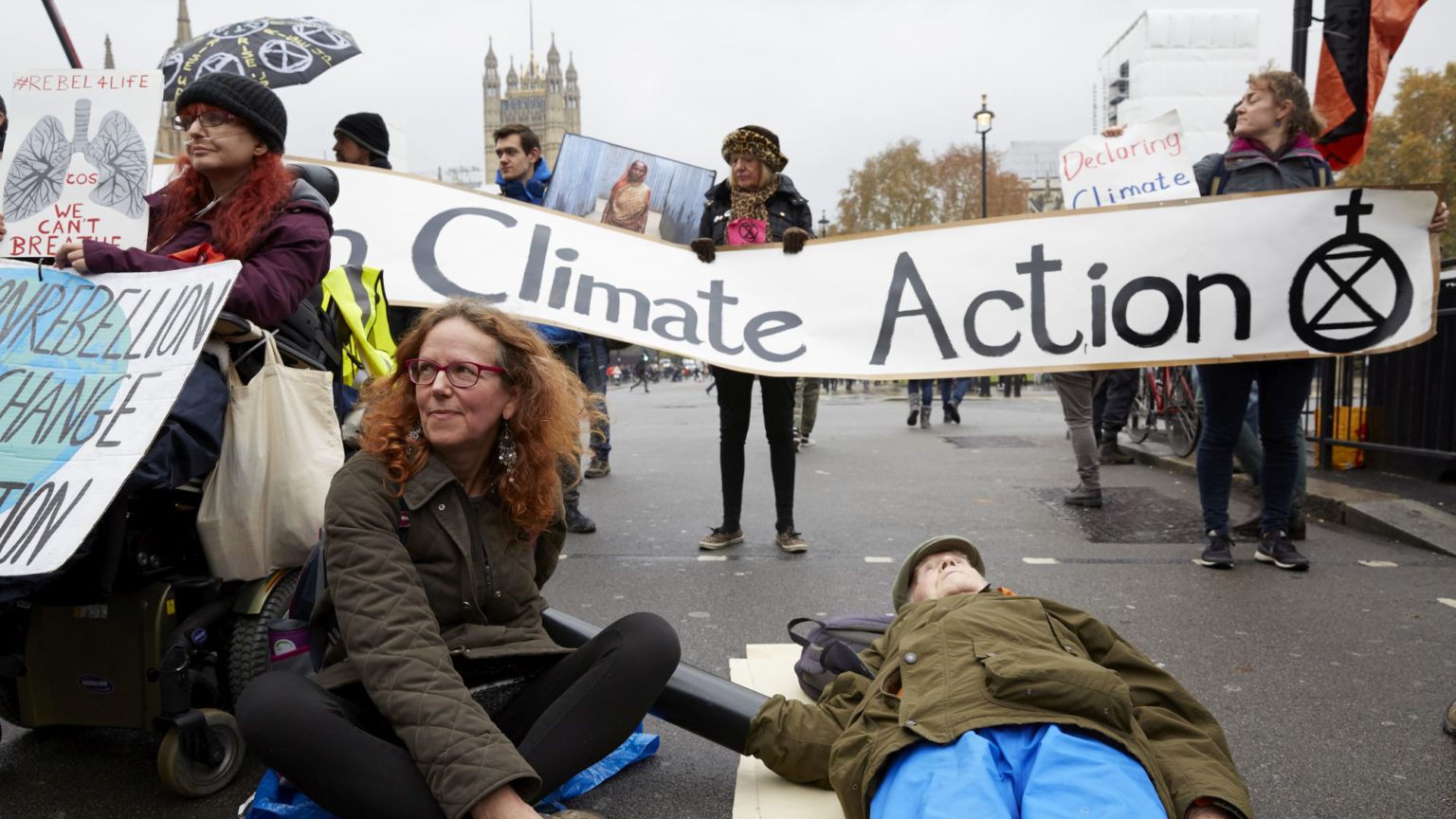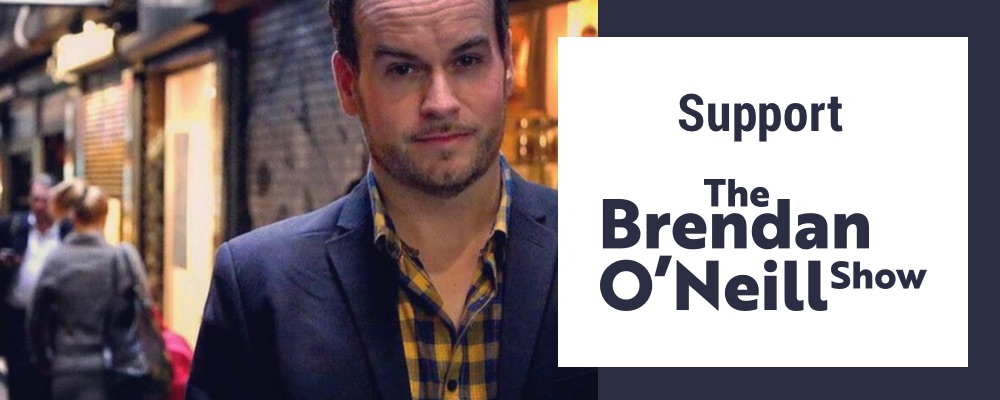The sad spectacle of climate activism
Extinction Rebellion is fighting for a miserable, authoritarian future.

Nothing says ‘take me seriously, I am here to save the planet’ quite like a fully grown man, with a full beard, dressed up as a Girl Guide. And nothing better forges a sense of solidarity with ordinary people than obstructing London’s bridges and roads, causing traffic gridlock. Protests such as this took place in London over the past two weekends as part of a new movement called Extinction Rebellion (XR), which claims the human race is heading for extinction and calls for carbon emissions to be cut to net zero by 2025.
For decades, direct action of this kind has been environmental activists’ preferred mode of expression. Movements with a weight of numbers behind them only need to demonstrate their size to illustrate how much they resonate with the wider public. Environmental protests, having no such public support, instead use direct action or spectacle to draw attention to themselves. As well as blocking London’s roads, XR activists also glued their hands to government buildings and to the gates of Buckingham Palace. Such stunts get a great deal of attention, but they rarely arouse much public sympathy.
Writing in the Guardian, Green MEP Molly Scott Cato claims that direct action is necessary because a conspiracy of ‘wealthy individuals and multinational corporations, backed by complicit politicians, has subverted the political process and blocked action’. But this conspiracy theory gets things completely the wrong way round. Climate change is almost exclusively a preoccupation of the wealthy. The global poor cannot afford to do without cheap fossil fuels like coal, while the working class in the West struggles to absorb the high cost of green taxes. Billionaires and corporations, on the other hand, fall over themselves to demonstrate their green credentials. And politicians from all parties, far from resisting environmentalist demands, compete to be the champions of environmentalism.
The UK’s Climate Change Act, passed in 2008 by the Labour government, was the first of its kind in the world. It bound the country to reduce greenhouse-gas emissions by 80 per cent. The current Conservative government is now considering plans that are even more extensive: reducing the UK’s CO2 emissions to zero by 2050. This will include the abolition of petrol and diesel engines, among other things. The only actual fetter on politicians’ green ambitions, so far, has been political reality. XR and its supporters demand regressive, authoritarian and controlling legislation to limit consumption and production. But in general, voters do not want to be poorer and less free.
For a glimpse of what the political reality has in store for green ambitions, take a peek at the protests on the other side of the channel. While last weekend’s Extinction Rebellion protests reportedly attracted 2,000 greens in London, the gilet jaunes movement, sparked by rising fuel taxes, has brought hundreds of thousands of people on to streets and motorways across the whole of France. Despite the inconvenience caused by the blockades and go-slows, the protests enjoy the support of around 70 per cent of the French public, reflecting the high level of opposition to President Macron’s green taxes.
Moreover, there is no other ‘rebellion’ in history that can match XR’s desperate, fawning obsequiousness. Protesting outside Buckingham Palace last Saturday, activist Gail Bradbrook read aloud a letter to the monarch: ‘With great humility, we now come to your majesty to implore you to act on our behalf: to fulfil your sacred duty to protect the realm.’ What kind of ‘rebellion’ appears ‘with great humility’? What kind of ‘rebellion’ begs the monarch to limit the material freedom of her subjects?
Sticking with the France comparison, this is akin to the starving peasants of the French Revolution demanding of the king and queen not only no cake, but also less bread.
The protesters themselves never tire of making historical comparisons. They flatter themselves with allusions to the Suffragettes, Gandhi and Martin Luther King. But King had ‘a dream’ in which places ‘sweltering with the heat of injustice, sweltering with the heat of oppression, will be transformed into an oasis of freedom and justice’. XR and other environmentalists, on the other hand, can only offer a nightmare vision: a catastrophic climate collapse to which the only remedy is ecological austerity.
History is full of weird, religious zealots with apocalyptic prognostications. While the climate debate is often presented as being about ‘the science’, environmentalists like XR’s Molly Scott Cato emphasise not science, rationalism and debate, but spiritual feelings. ‘As a Quaker, I don’t believe that spiritual wisdom resides in books or rituals but in the still, small voice that tells you when something must change’, she writes. The environmentalists’ belief in an impending apocalypse is a kind of religious conviction.
Another XR campaigner and co-religionist of Scott Cato, Rupert Read, writes in the Conversation that, ‘As a Quaker, I cherish the opening words of the famous Shaker hymn: Tis the gift to be simple’. Chillingly, he adds his own twist: ‘It isn’t enough to live a life of voluntary simplicity.’ Climate activism, ultimately, is about the authoritarian regulation of other people’s lives.
Doom-mongers have existed throughout history. But the question is, why have the likes of Extinction Rebellion become so prominent, causing such a splash in the media? It is a symptom of our times. The movement has emerged in an atmosphere where politicians struggle to offer a compelling vision of the future and are instead preoccupied with staving off a looming catastrophe. The self-styled rebels of XR, rather than standing against this pessimistic zeitgeist, epitomise it.
Ben Pile blogs at Climate Resistance.
Picture by: Getty.
To enquire about republishing spiked’s content, a right to reply or to request a correction, please contact the managing editor, Viv Regan.












Comments
Want to join the conversation?
Only spiked supporters and patrons, who donate regularly to us, can comment on our articles.